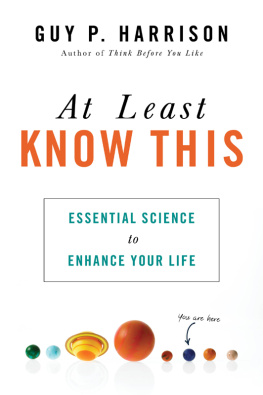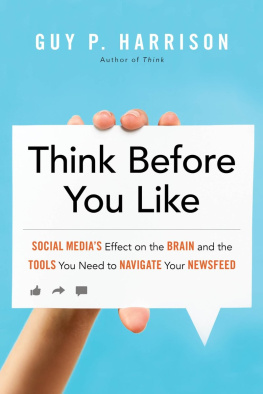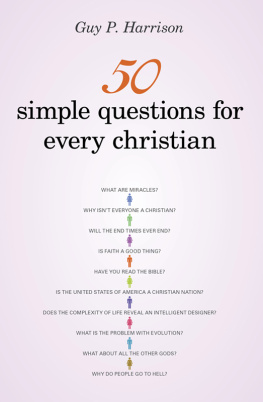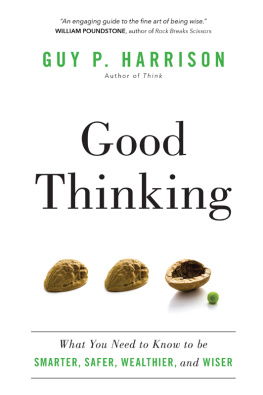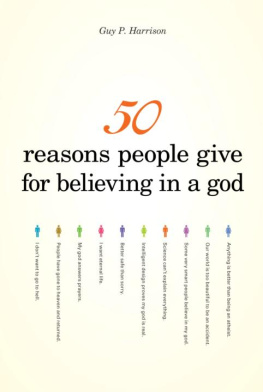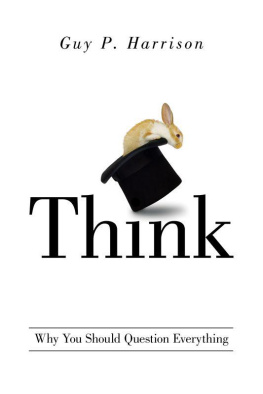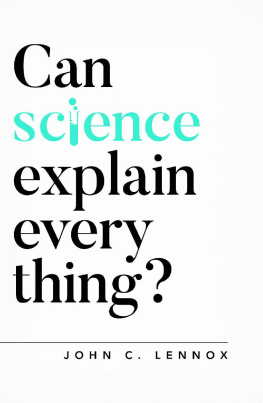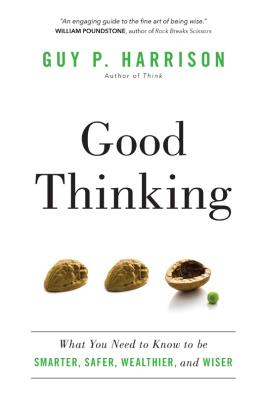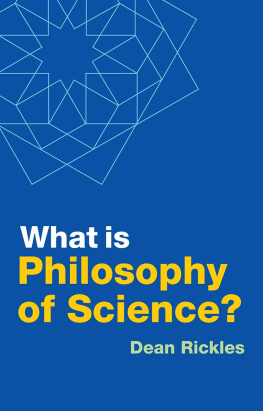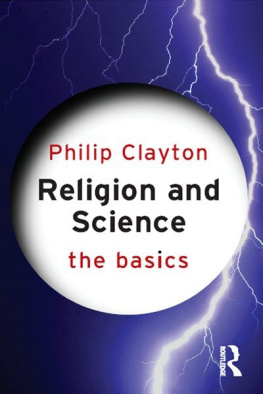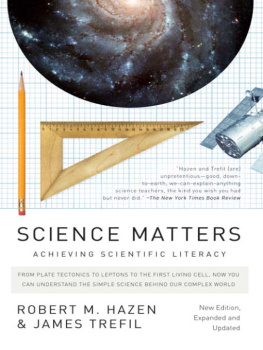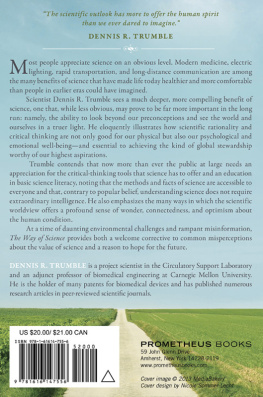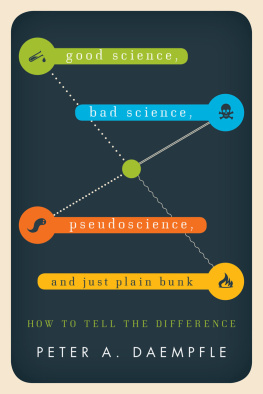I am immensely grateful to the following people for their important contributions to this book: Jade Zora Scibilia, Steven L. Mitchell, Robert DeAngelo, Kenneth L. Feder, Doug Hansen, Lewis Wynne, Ethan Siegel, Hanna Etu, Catherine Roberts-Abel, Bruce Carle, Liz Mills, David Siegel Bernstein, Nancy Forbes, Joel N. Shurkin, Rob Dunn, Paul Braterman, Cathy Cobb, Josephine DeVera, Augustin Fuentes, John Cryan, Donald Lowe, Brian Koberlein, John Bochanski, Richard Lathe, Walter Scheidel, Greg Simpson, Phil Torres, Donald Lowe, Kelly Frede, Miki Hardisty, Yuri You, and Coni Harrison.
ALSO BY GUY P. HARRISON
Think Before You Like
Think: Why You Should Question Everything
Good Thinking: What You Need to Know to Be Smarter, Safer, Wealthier, and Wiser
50 Popular Beliefs That People Think Are True
50 Simple Questions for Every Christian
50 Reasons People Give for Believing in a God
Race and Reality

Guy P. Harrison is a passionate advocate for science and reason. He enjoys sharing his positive, constructive style of skepticism and science appreciation with people whenever possible. Guy has a degree in history and anthropology and has visited more than thirty countries on six continents. Having seen some of the best and worst of our world, he believes that we can do better. Guy maintains that if more people embraced the principles of science and applied more critical thinking in their lives, we could significantly reduce human suffering and become a much more efficient, safer, and productive species.
As a journalist, Guy has worked in many roles, including editorial writer, world-news editor, sports editor, reporter, feature writer, and columnist. He won the Commonwealth Award for Excellence in Journalism and the WHO (World Health Organization) Award for Health Reporting. Guy has also interviewed many leading scientists and historical figures. He writes about diverse topics, including poverty in the developing world, conservation issues, religion, brain science and unconscious biases, war, racism, gender discrimination, space exploration, and human origins.
Guy is the author of seven previous books that have been popular with readers and highly acclaimed by critics. They are: Think Before You Like: Social Media's Effect on the Brain and the Tools You Need to Navigate Your Newsfeed; Good Thinking: What You Need to Know to Be Smarter, Safer, Wealthier, and Wiser; Think: Why You Should Question Everything; 50 Simple Questions for Every Christian; 50 Popular Beliefs That People Think Are True; 50 Reasons People Give for Believing in a God; and Race and Reality: What Everyone Should Know about Our Biological Diversity. Random House selected Think as part of its national First Year Experience/Common Reads program, which promotes it as recommended reading for first-year university students. Several of Guy's books are currently or have been required reading in university courses.
Guy is a lifelong fan not only of science and history but also of science fiction. He says he's not ashamed to confess his deep love for alien visitations, robot uprisings, time machines, and interstellar travel. He lives in Southern California, where he enjoys running, hiking, biking, reading, and writing.
Guy is also an expert blogger for Psychology Today. Read his essays at About Thinking (www.psychologytoday.com/blog/about-thinking) and visit his website at www.guypharrison.com. Follow Guy on Twitter, @Harrisonauthor.

Ackerman, Diane. The Human Age: The World Shaped by Us. New York: W. W. Norton, 2014.
Angier, Natalie. The Canon: A Whirligig Tour of the Beautiful Basics of Science. New York: Houghton Mifflin, 2007.
Ben-Barak, Idan. The Invisible Kingdom. New York: Basic Books, 2009.
Brockman, John, ed. What Have You Changed Your Mind About? New York: Harper Perennial, 2009.
. What Should We Be Worried About? New York: Harper Perennial, 2014.
. What to Think about Machines That Think: Today's Leading Thinkers on the Age of Machine Intelligence. New York: Harper Perennial, 2015.
Buonomano, Dean. Your Brain Is a Time Machine: The Neuroscience and Physics of Time. New York: W. W. Norton, 2017.
Burton, Frances D. Fire: The Spark That Ignited Human Evolution. Albuquerque: University of New Mexico Press, 2009.
Carroll, Sean. From Eternity to Here: The Quest for the Ultimate Theory of Time. New York: Dutton, 2010.
Chamovitz, Daniel. What a Plant Knows: A Field Guide to the Senses. New York: Scientific American, 2012.
Corfield, Richard. Lives of the Planets: A Natural History of the Solar System. New York: Basic Books, 2007.
Coyne, Jerry. Why Evolution Is True. New York: Viking, 2009.
Dawkins, Richard. The Ancestor's Tale: A Pilgrimage to the Dawn of Evolution. Boston: Houghton Mifflin, 2004.
. The Blind Watchmaker: Why the Evidence of Evolution Reveals a Universe without Design. New York: W. W. Norton, 1996.
. Climbing Mount Improbable. New York: W. W. Norton, 1997.
. The Greatest Show on Earth: The Evidence for Evolution. New York: Free Press, 2009.
. The Magic of Reality: How We Know What's Really True. New York: Free Press, 2011.
. The Selfish Gene. Oxford: Oxford University Press, 1989.
. Science in the Soul. London: Bantam, 2017.
DeGrasse Tyson, Neil. Death by Black Hole: And Other Cosmic Quandaries. New York: W. W. Norton, 2007.
DeGrasse Tyson, Neil, Michael A. Strauss, and J. Richard Gott. Welcome to the Universe: An Astrophysical Tour. Princeton, NJ: Princeton University Press, 2016.
Dennett, Daniel C. From Bacteria to Bach and Back: The Evolution of Minds. New York: W. W. Norton, 2017.
Fairbanks, Daniel J. Everyone Is African: How Science Explodes the Myth of Race. Amherst, NY: Prometheus Books, 2015.
Fish, Jefferson M. The Myth of Race. N.p.: Argo-Navis, 2012.
Fortey, Richard. Life: A Natural History of the First Four Billion Years of Life on Earth. New York: Vintage, 1998.
Frans de Waal. The Age of Empathy: Nature's Lessons for a Kinder Society. New York: Harmony Books, 2009.
Frazier, Kendrick. Science under Siege: Defending Science, Exposing Pseudoscience. Amherst, NY: Prometheus Books, 2009.
Freedman, Carl. Conversations with Isaac Asimov. Jackson: University Press of Mississippi, 2005.
Fuentes, Agustin. The Creative Spark: How Imagination Made Humans Exceptional. New York: Dutton, 2017.
. Race, Monogamy, and Other Lies They Told You: Busting Myths about Human Nature. Oakland: University of California Press, 2012.
Garreau, Joel. Radical Evolution: The Promise and Peril of Enhancing Our Minds, Our Bodiesand What It Means to Be Human. New York: Doubleday, 2005.
Gould, Stephen Jay. The Flamingo's Smile: Reflections in Natural History. New York: W. W. Norton, 1985.
. Ever Since Darwin: Reflections in Natural History. New York: W. W. Norton, 1992.
. Hen's Teeth and Horse's Toes: Further Reflections in Natural History. New York: W. W. Norton, 1983.

